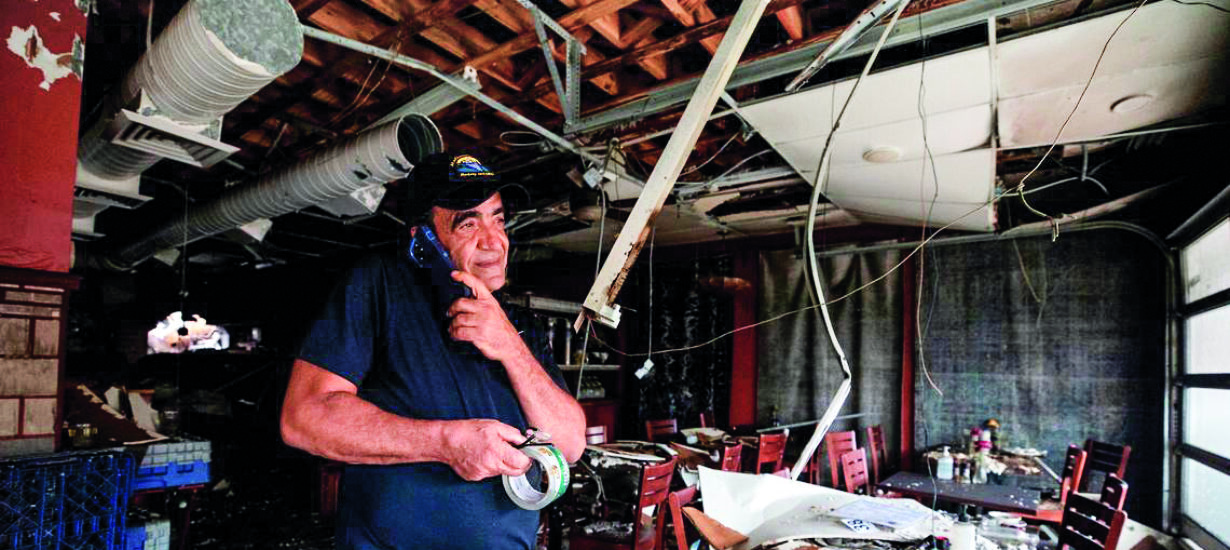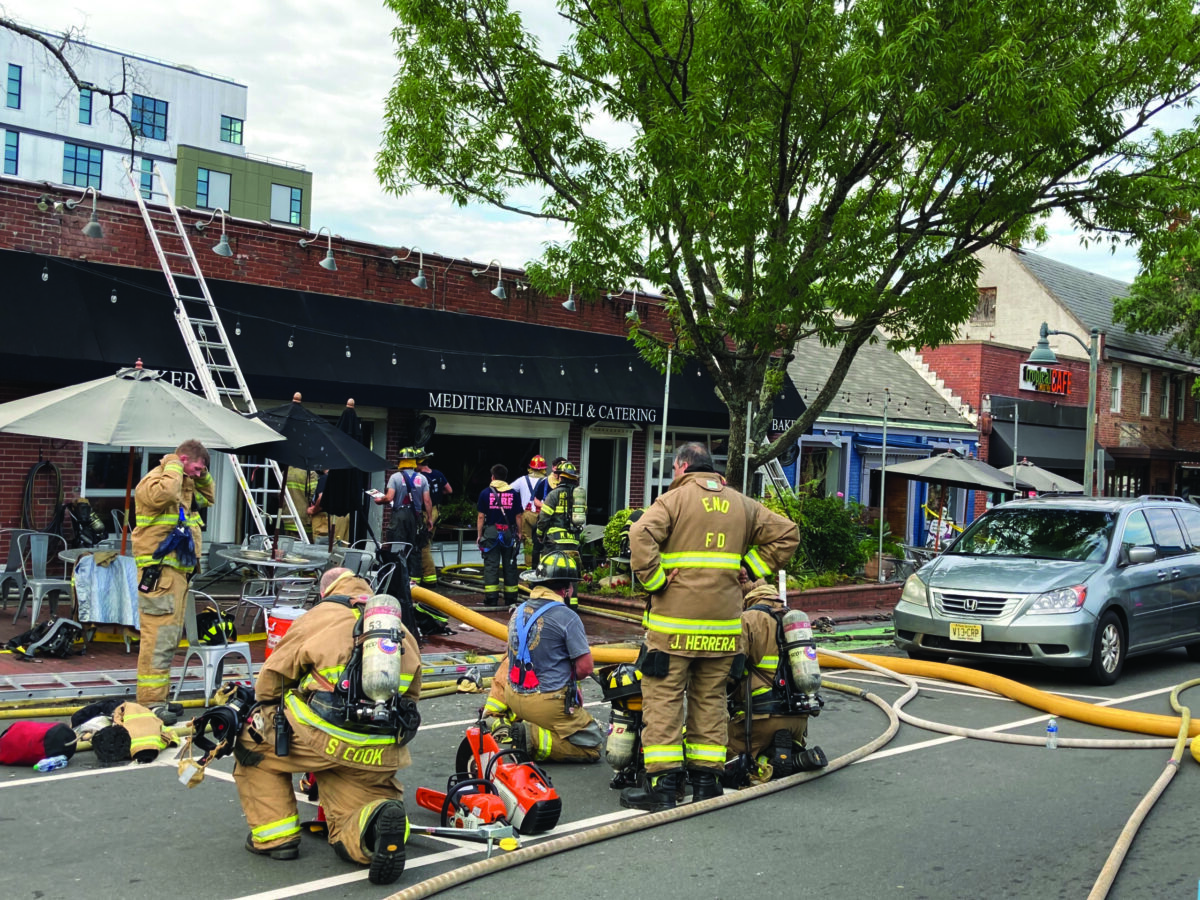Fire Damages Med Deli: “We’ll get through this.”

Jamil Kadoura stood across Franklin Street, staring at the husk of his restaurant, Mediterranean Deli. Three hours after he first saw a little lick of fire on his roof, a flame so small he tried to tamp it out with his hands, firefighters hovered in bucket trucks overhead, shooting streams of water intermittently from a hose to quench every last hot spot.
Other restaurateurs on the block offered Kadoura some dinner, but he wasn’t going to leave until he was allowed back inside — the way people wait for permission from a medical team to enter a hospital room to say goodbye to a loved one who has died. “It spread so fast,” he said. “It’s hard to process.”
Midafternoon on July 22, shortly before the fire, Med Deli was “packed like sardines” with customers, Kadoura said. He was in the back and smelled something odd. His nose knows every aroma in the restaurant, and, he said, “I knew something was wrong.”
A contracting crew had been working all week on the flat roof of his century-old building, using a blow torch to seal the coating. They’d finished for the day, yet an unusual smell remained. Kadoura climbed the building’s metal ladder to the roof and noticed a tongue of flame coming from underneath the rubber membrane. He called a worker downstairs to tell everyone to evacuate.
Kadoura tried to pat the flame out, but the fire had burned away much of the subroof — the surface he was standing on that could collapse at any moment. The flame now had access to more oxygen and the petroleum-based rubber membrane and spread rapidly. Kadoura hustled down the ladder as he called 911. He went back into the restaurant to make sure everyone was out, checking the bathrooms. By the time he headed to the door, “I couldn’t see my finger, the smoke was so black,” he said.
The fire severely damaged the interior of the building and the roof, and smoke and water harmed some nearby businesses. Med Deli will reopen, Kadoura vowed, though he has no idea when.
From dishwasher to owner
Kadoura opened Mediterranean Deli on April 6, 1992 — he knows the day like he knows his own birthday — in a small storefront a couple doors to the west of his current location. He’d emigrated from Palestine and studied business management in Minnesota before entering the food and beverage industry, starting as a dishwasher. Promotion followed promotion until he became director of food and beverage in a hotel and from there followed his dream to open his own restaurant — the original Med Deli was a 6-foot deli counter and 12 seats.
For more than 30 years, Kadoura arrived at his restaurant at 4 in the morning to prep. As he’d roll out of bed in the dark, his wife would put her own spin on an iconic 1980s donut commercial and say, “Time to make the falafel.”
Kadoura’s hard work paid off. His business grew over the decades, and he bought little parcels of real estate downtown as he could afford it: The Dead Mule building; a vacant lot for employee parking; a small building he renovated into an event space called The Story. He catered events and was so in demand during graduation weekends that he’d sleep in his office. After one marathon weekend, his back seized up, but he told himself, “This is the pain of love. You did something good today.”

A GoFundMe page was created to raise money to support Med Deli’s employees, with a fundraising goal of $195,000. At press time, the page had garnered almost $214,000 in donations from more than 3,000 contributors. (Photo: Nancy E. Oates)
Med Deli’s employees became like family. On average, they have worked for Kadoura for about 13 years. He knows their spouses and has watched their children grow up. “I love what I do,” he said. “This isn’t my business, it’s my home.”
Firefighters evacuated all the businesses on the block as they worked on containing the fire. Three firefighters suffered minor injuries. Hours after the fire, about 20 workers wearing their black Med Deli T-shirts still sat across the street at the McDonald’s patio, somber and shaken, like there’d been a death in the family. Some West Franklin Street merchants offered to hire Med Deli staff while the restaurant is closed.
“We got through COVID,” Kadoura said. “We’ll get through this. This place will stay for my children.”
A few days after the fire, Kadoura announced he would fill existing catering orders and take new ones. He owns 454 W. Franklin St., the former location of Elaine’s, and can prepare food there while he looks for a larger space. He has another location in Lenoir Hall on campus.
Other businesses damaged
Four nearby businesses were affected by smoke and water damage and had no electricity. Tropical Smoothie Café was able to reopen days later, and Moshi Moshi hair salon redirected its stylists and customers to its salon in Durham.
Others weren’t so lucky. Karen Cunningham, owner of Simply Audrey, which sells unique items from her collection of preowned haute couture and vintage clothing and accessories, salvaged some merchandise and offered it for sale online. It will take her some time to curate new inventory, but her business will reopen, she said. Cunningham posted on her website: “I am officially in beast mode. Nothing is going to stop me from making my little shop even better and brighter than it was before!”
Cosmetologist and oenophile David Sutton ’92, owner of D.B. Sutton & Co., which started as a hair salon in 1999 and later added a wine shop, opened the morning after the fire to sell the wine that would spoil without air-conditioning. Customers lined up in the hot sun to place their orders. Sutton sold nearly 80 percent of his stock.
“I was pleased so many people showed up and offered their support in this difficult time,” Sutton said. He found a temporary place to operate his salon.
Chapel Hill Town Council member Adam Searing ’94 (MPH, JD), a candidate for mayor, stood in line at D.B. Sutton’s on Sunday and bought several bottles of wine, then took to Twitter to urge others to do the same.
“These business owners may make a point of reaching out to people with disabilities to find great employees, or they may donate time, money, and goods and services to local schools and organizations, or they may be community gathering places,” Searing said in an interview. “However they give back, they’re making a point to be more than the business they’ve created. They’re a critical part of our town’s life.”
— Nancy E. Oates
Thanks for reading the Carolina Alumni Review
Carolina Alumni members, sign in to continue reading.
Not yet a member? Become one today.
